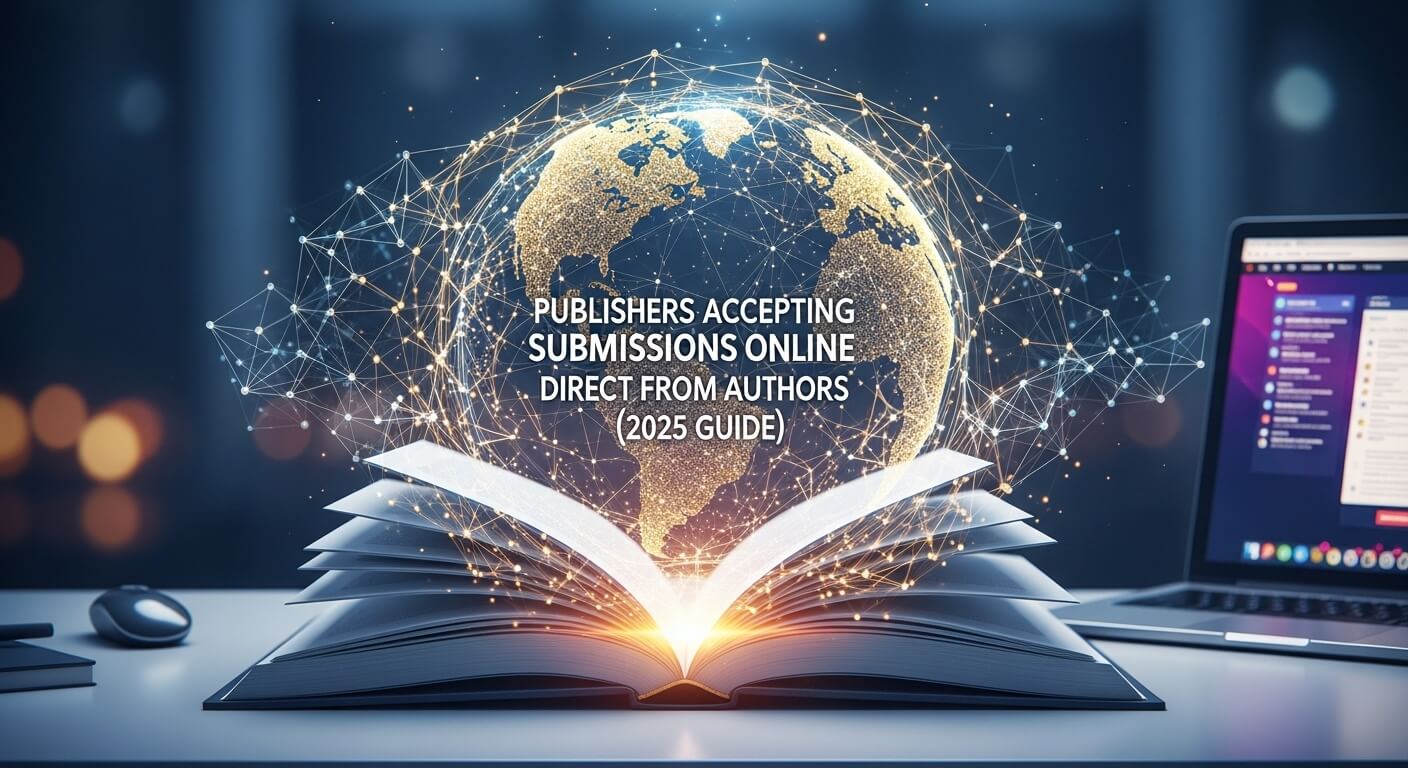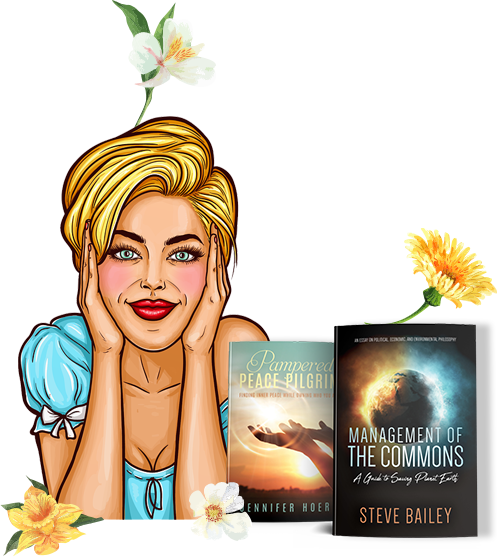Publishers Accepting Submissions Online Direct from Authors (2025 Guide)
Publish Your Book View 50% off Pricing
Table of Contents
ToggleLooking for Publishers that Accept Direct Submissions from Authors?
In 2025, several traditional and independent publishers — including Baen Books, DAW Books, Kensington, Collective Ink, and Allen & Unwin — accept online manuscript submissions without a literary agent. Authors can submit queries, synopses, or full manuscripts directly via publisher websites or portals. Read below for a complete list, submission tips, and what to expect after sending your work.
Publishers Accepting Online Submissions Directly from Authors
The world of book publishing is rapidly evolving — and in 2025, authors no longer need a literary agent to get their stories published. Today, an increasing number of publishers accepting submissions online are opening their doors to unagented authors, making it easier than ever for new writers, independent authors, and diverse storytellers to break into the publishing industry. Through direct submissions and online manuscript portals, debut novelists and indie creators can now submit their fiction, nonfiction, or YA manuscripts directly to traditional and independent publishing houses worldwide.
This comprehensive guide explores everything you need to know about submitting your manuscript without an agent — including what direct submission really means, why it’s a growing trend in modern publishing, which publishers are currently accepting unsolicited manuscripts, how to submit your book professionally online, and essential submission tips to boost your acceptance chances and land your first publishing contract in 2025.
1. What Are Direct Submissions?
Direct submissions (also called unsolicited manuscripts) mean you can send your book proposal, query, or manuscript to a publisher without needing an agent.
Instead of going through the traditional agented route, authors can now:
- Upload manuscripts via publisher portals
- Email editors directly (where allowed)
- Use submission management tools like Submittable
Many independent publishers and select imprints of major houses have realized that great stories can come from anywhere — not just through agents.
2. Why Authors Are Submitting Directly in 2025
a. Accessibility
Authors from around the world can now reach professional editors instantly — no middleman required.
b. Equal Opportunity
Direct submission platforms help new and underrepresented authors bypass traditional gatekeeping.
c. Faster Feedback
Online portals often provide tracking systems and submission confirmation, something agents rarely offer.
d. Simplicity
Digital-first publishers like Carina Press and Collective Ink have streamlined systems — no postage, no paperwork.
3. Pros and Cons of Submitting Without an Agent
| Advantages | Challenges |
|---|---|
| Direct access to publishers | Limited feedback |
| No agent commission | Contract negotiation is your responsibility |
| Shorter query-to-response time | Long waiting periods (2–6 months typical) |
| Perfect for niche genres | Smaller advances than major imprints |
Still, many successful authors — especially in romance, fantasy, and literary fiction — got their start through direct submission.
4. Publishers Accepting Online Submissions (No Agent Required)
Below is a verified list of reputable publishers open to unagented online submissions as of 2025:
| Publisher | Genres Accepted | Submission Type |
|---|---|---|
| Baen Books | Science fiction & fantasy | Submit full manuscripts via online portal |
| DAW Books | Speculative fiction | Email submission of full or partial manuscripts |
| Kensington Publishing Corp. | Romance, thriller, mystery | Accepts queries and sample chapters via email |
| Collective Ink (John Hunt Publishing) | Spirituality, nonfiction, select fiction | Online submission system with genre-specific imprints |
| Skyhorse Publishing | Nonfiction, lifestyle, memoirs, select fiction | Online proposal submission |
| Etruscan Press | Literary fiction, poetry, essays | Submittable form; open year-round |
| Allen & Unwin (Australia) | Fiction, nonfiction, YA, children’s | “Friday Pitch” online submission every week |
| Pan Macmillan Australia | General & commercial fiction | Accepts submissions through online portal |
| Flame Tree Press (UK) | Horror, Gothic, dark fantasy | Online form submissions; accepts debut authors |
| Harlequin / Carina Press | Romance & women’s fiction | Digital-first submissions via Harlequin portal |
| Black & White Publishing (UK) | Humor, memoir, nonfiction | Direct email submissions open year-round |
| Chronos Publishing (UK) | Historical fiction, adventure | Accepts full manuscripts via email |
💡 Pro Tip: Always visit the publisher’s official “Submissions” page before sending your manuscript. Submission windows, formats, and genre requirements change often.
5. How to Submit Your Manuscript Online
Follow this five-step roadmap for a professional and polished submission:
Step 1: Write a Strong Query Letter
Introduce your book in 200–300 words. Include:
- Title, genre, and word count
- A one-sentence hook or logline
- A short synopsis (main plot & conflict)
- Author bio and contact info
Step 2: Prepare a Synopsis
Condense your entire story (including the ending) into one page. Be clear and direct.
Step 3: Format the Manuscript
Use industry-standard layout:
- 12-pt Times New Roman, double-spaced
- 1-inch margins, page numbers
- File saved as
.docxor.pdf
Step 4: Submit via Official Portal
Upload through the publisher’s online system or email per their instructions. Always name your file clearly (e.g., Lastname_Title.docx).
Step 5: Track Your Submissions
Keep a spreadsheet of where and when you submitted, the editor’s name, and any responses.
6. Tips to Increase Acceptance Odds
- Research the publisher’s catalog — match your tone and genre.
- Personalize your email — mention why your book fits their list.
- Proofread everything — one typo can ruin a first impression.
- Be patient but persistent — follow up after 3–4 months if no reply.
- Network online — many editors scout talent via writing communities and contests.
7. Legitimate vs. Vanity Publishers
When submitting online, always confirm legitimacy.
Avoid “pay-to-publish” or vanity presses that charge you upfront fees.
Red Flags:
- Promises of guaranteed publication
- No distribution to major retailers (Amazon, Waterstones, etc.)
- Lack of editorial staff info
- Vague contracts
Check publishers against watchdog sites like Writer Beware (SFWA.org) or Absolute Write before signing anything.
8. Benefits of Independent and Small Publishers
Working with a small or indie press offers unique advantages:
- Closer author-editor collaboration
- Faster production timelines
- Creative control over covers and titles
- Higher royalties (often 30–50% on eBooks)
- Support for debut authors in niche markets
Though advances may be modest, smaller presses often champion new voices that mainstream publishers overlook.
9. International Publishers Accepting Submissions
Depending on your region, here are a few more options:
United States
- Sourcebooks
- Entangled Publishing
- North Atlantic Books
United Kingdom
- Head of Zeus
- Bookouture (digital-first)
- Bloodhound Books
Australia & New Zealand
- Text Publishing
- Fremantle Press
- Pantera Press
South Asia
- Rupa Publications
- Notion Press
- Leadstart Publishing
10. After You Submit: What Happens Next
Once you’ve submitted:
- You’ll receive a confirmation email.
- Your manuscript enters the “slush pile” for editorial review.
- If it passes the initial read, an editor may request a full manuscript or revisions.
- Final approval leads to a publishing contract.
Average response times:
- Small press: 1–3 months
- Mid-size publisher: 3–6 months
- Large house: Up to a year
If you haven’t heard back, it’s okay to follow up politely after the stated review period.
11. Understanding Publishing Contracts
When a publisher offers you a contract:
- Review clauses on royalties, rights, and exclusivity.
- Negotiate for reversion rights (so you regain control if the book goes out of print).
- Clarify digital, print, and foreign rights.
Consider joining a writers’ association like:
- Authors Guild (US)
- Society of Authors (UK)
- ALLi (Alliance of Independent Authors)
They offer free contract reviews and legal guidance.
12. Should You Still Seek an Agent Later?
Yes — many authors start with direct submissions and later sign with agents to handle:
- Negotiating better deals
- Selling translation and film rights
- Expanding career management
Direct submission can be your first big break — and agents often approach authors after seeing a publisher pick them up.
13. The Digital Future of Publishing
Thanks to the internet, the publishing world has never been more accessible.
Platforms like Submittable, QueryTracker, and Manuscript Wishlist (#MSWL) let authors find open calls year-round.
In addition, many major houses now host Open Submission Events on social media — short windows where authors can pitch editors directly via hashtags like #PitMad or #RevPit.
14. Final Thoughts: Your Story Deserves to Be Read
Getting published without an agent is no longer a fantasy — it’s a real, attainable path. The key is professionalism, persistence, and preparation.
Start by researching your target publishers, craft a compelling submission package, and trust your story’s power to connect.
Every great author started with a single submission — and yours could be next.
Disclaimer: The publishers listed here are provided for informational purposes only. We are not affiliated with these publishers and do not guarantee manuscript acceptance. We only provide professional book editing, marketing, and formatting services to help authors prepare their work for submission and improve their chances of acceptance. Always verify submission details on the publisher’s official website before applying.





